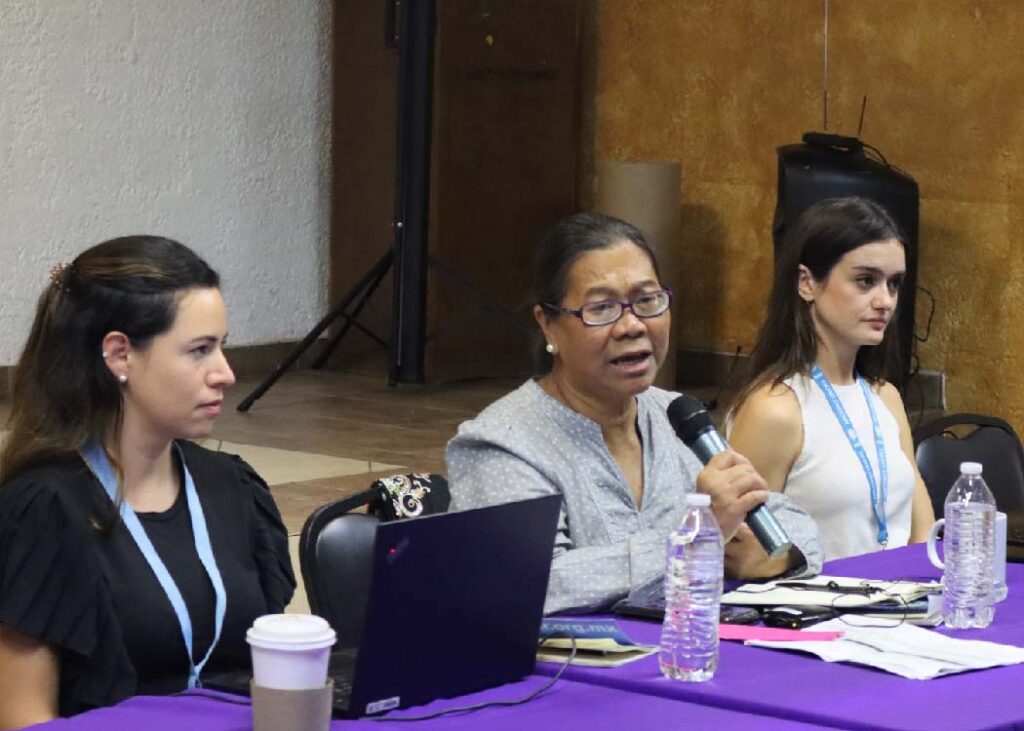Chihuahua, Chih., Mexico, September 02, 2022. During the visit, groups of people who are victims of Internal Forced Displacement (DFI) and civil society organizations expressed concern because the number of people in said condition is not accurately known, but according to the estimates given by the Ministry of the Interior in our country there are between 262,411 and 357,000 people in conditions of internal forced displacement.
Yesterday and today, we received in the state of Chihuahua the official visit of Cecilia Jiménez-Damary, United Nations Special Rapporteur on the human rights of Internally Displaced Persons. The event allowed various meetings to be held, mainly with people affected by IFD, as well as civil society organizations that accompany them.
During the first day, the rapporteur had the opportunity to listen directly to those who face IFD, where the testimonies explained what it means to be in that situation, “we left everything behind, they took away even our clothes, our food; they burned down our homes and killed several people. We can no longer return to our place of origin; it is no longer safe. So far, we have not received a response from the government, they do not listen to us, and nothing is done so that we can return to our homes. We are tired of changing houses, jobs, of not being able to pay the rent. Something needs to be done to bring peace to the mountain areas”, said one of the participants.
Displaced people face conditions of discrimination, marginalization, and precariousness due to the lack of a public policy that responds to the situation in which they find themselves. Additionally, many of them said that they are sometimes stigmatized and criminalized for having been victims of violent acts, a situation that generates the false belief that they belonged to organized crime groups (which threaten them and force them to leave their homes). Along with the displacement, they live in fear that the aggressors will take other measures because they continue to seek justice and the restitution of their right to live in a safe home.
The civil society organizations that have accompanied the families in IFD have identified that the violence faced by the communities usually comes mainly from the following sources: illegal logging, land dispossession (to plant poppies and marijuana, and for mining projects); or a simple method to control the territory, which is usually linked to the recruitment of young people by organized crime.
Families that are forced to leave their land and seek refuge often face acts of extreme violence, where the situation forces them to choose between their way of life and being able to stay alive. In addition, women are even more vulnerable and are subjected to gender-based threats and aggressions, such as sexual violence.
On the second day of today’s visit, a group of around 25 displaced women had a space to talk to the rapporteur and her team, telling their stories and impacts from a differentiated perspective.
On the other hand, civil society organizations that accompany this problem also discussed challenges in doing our work, strategies and recommendations for the three levels of government, where we emphasized the lack of a specific public policy to respond to the people who have been forcibly displaced; This is related to the lack of legal instruments in Mexico that establish the responsibilities of the authorities, thus the crime is not typified at the national and state level; The General Law on Internal Forced Displacement has been frozen in the Senate since 2020. Displaced people are deprived of all their resources, which makes it difficult to obtain support and even file complaints (an extremely dangerous decision since displacements usually occur in a context of macro crime).
They stated that humanitarian aid is difficult to manage because displaced persons require housing, food, clothing, education, among many other tangible and intangible things that they have been deprived of and need in order to resume their life projects.
It has been determined that the current Chihuahua State Government administration has reduced the resources of the Executive Commission for Attention to Victims of the State of Chihuahua (CEAVE) and has even revictimized and criminalized them, saying that they are part of organized crime, a situation that has limited or eliminated access to services.
As organizations, we are concerned that there is no entity in the state that directly addresses this problem because IFD puts people at risk of suffering other serious violations of their human rights, such as enforced disappearance. We believe that the institutionalization of public policies in the care of displaced persons is necessary, starting with an in-depth analysis of the context, an official, truthful and updated registry of IFD that helps learn the magnitude of the problem.
During the conversation, members of the organizations pointed out that as long as the militarization of public security continues and the General Law on Internal Forced Displacement is not approved, we will not be even close to beginning to address this problem adequately.
An invisibilized part of the already hardly visible victims of forced displacement are those who denounce, such as journalists and human rights defenders. In Chihuahua there was already a precedent in the “Early warning for the protection of human rights defenders and journalists” recognized as an unprecedented exercise of service; however, this was abandoned by the new state government administration.
The last visit of the rapporteur took place in 2018; some of the people who met with her on that occasion were there again, not having been able to find support or a solution to their problem, they mentioned that; “Years have gone by, and we are meeting with the rapporteur again, but we still can’t go back. We have lost not only our property, but our traditions, our sons and daughters are growing up without learning our language”. IFD is a serious violation of human rights and is a phenomenon resulting from the extreme violence present in Mexico, especially in the northern states such as Chihuahua. Since we do not have an effective service mechanism, we appreciate the rapporteur’s visit and urge the State to turn its attention to this situation, heeding the recommendations issued after the official visit to our country. The undersigned organizations documented for the rapporteur’s visit a total of 61 displacement events with at least 1703 victims, with 648 women, 508 men and 524 girls and boys.



